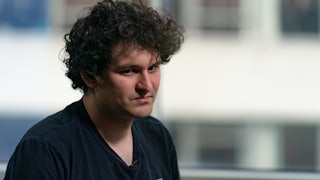During a recent nighttime bout of insomnia, I plucked from my shelf a paperback of Charles Dickens’s Hard Times. A receipt tucked inside informed me that I acquired the book on a 1998 visit to Shakespeare & Company in Paris, but of course the book was first published in London in 1854, first as a serial in Dickens’s magazine Household Words and subsequently as a book. That makes it all the more remarkable that Hard Times tells the story of Sam Bankman-Fried.
Hard Times is Dickens’s most sustained attack on utilitarianism, the philosophy, invented by Jeremy Bentham, that says the sole aim for a moral society is to achieve the greatest good for the greatest number. In Hard Times the stand-in for Bentham (more precisely, for James Mill, father to John Stuart Mill) is Thomas Gradgrind, a successful wholesaler of hardware turned educator who’s on his way to becoming a member of Parliament. Here is how Dickens, the greatest caricaturist in English literature, introduces Gradgrind:
A man of realities. A man of facts and calculations. A man who proceeds upon the principle that two and two are four, and nothing over, and who is not to be talked into allowing for anything over.… With a rule and a pair of scales, and the multiplication table always in his pocket, sir, ready to weigh and measure any parcel of human nature, and tell you exactly what it comes to. It is a mere question of figures, a case of simple arithmetic.
Gradgrind is not unlike Joseph Bankman, Ralph M. Parsons Professor of Law and Business at Stanford and father to Sam. Like Gradgrind, Bankman père is (according to a description by his wife, Barbara Fried, William W. and Gertrude H. Saunders Professor of Law Emerita at Stanford) a “take-no-prisoner utilitarian.”
Here’s how Dickens describes the indoctrination of Gradgrind’s children:
No little Gradgrind had ever associated a cow in a field with that famous cow with the crumpled horn who tossed the dog who worried the cat who killed the rat who ate the malt, or with that yet more famous cow who swallowed Tom Thumb: it had never heard of those celebrities, and had only been introduced to a cow as a graminivorous ruminating quadruped with several stomachs.
Here’s how Barbara Fried describes husband Joseph’s indoctrination of their children (from her book Facing Up to Scarcity: The Logic and Limits of Nonconsequential Thought):
When Sam was about fourteen, he emerged from his bedroom one evening and said to me, seemingly out of the blue, “What kind of person dismisses an argument they disagree with by labeling it “the Repugnant Conclusion?”
Sam, his brother Gabriel, and Joseph are a “hardy band,” Fried writes,
that has shown me by example the nobility of the ethical principle at the heart of utilitarianism: a commitment to the wellbeing of all people, and to counting each person—alive now or in the future, halfway around the world or next door, known or unknown to us—as one.
Fried is describing the variety of utilitarianism known as Effective Altruism, which, as I’ve written earlier, is notably hospitable to billionaires who don’t wish to pay taxes. Sam was “earning to give,” pledging to spend his multibillion-dollar fortune—even as he moved his company to an offshore tax haven—to advance an eccentric basket of causes like ending factory farming and preventing artificially intelligent computers from enslaving humans. These he deemed a much better use of his vast fortune than the dreary business of government.
The chief eccentric cause favored by utilitarians in Dickens’s day was the 1834 Poor Law, which consigned the indigent to workhouses. That was obviously much worse than being nice to farm animals or making sure tomorrow’s computers have an on-off switch, but it was born of a similarly hubristic notion of the public good. Proponents of the Poor Law saw it as a humanitarian alternative to pauperism. One of its principal authors was a Bentham disciple.
In Hard Times, Gradgrind’s utilitarian philosophy glosses over the more brutal aspects of industrialization in Coketown, Dickens’s fictional manufacturing center, “a town of machinery and tall chimneys” whose looms roar like the cries of elephants. For Bankman-Fried, effective altruism glosses over the postindustrial casino that is the cryptocurrency market. Industrialization was a societal good that created vast wealth but distributed it unevenly and befouled the planet. Postindustrialism creates vast wealth, distributes it even more unevenly, and, when the medium is crypto, befouls the planet.
If Joseph Bankman is Thomas Gradgrind, who’s Sam Bankman-Fried? I see him as an amalgam of Thomas’s wayward son Tom, whom Dickens calls “the whelp,” and Gradgrind’s star pupil at his utilitarian school, Bitzer. (Spoilers ahead.)
Tom’s utilitarian upbringing leaves him pathologically indolent and selfish. He ends up robbing a bank in order to pay off his debts and nearly succeeds in pinning it on an innocent man. Bankman-Fried, by his own admission, became similarly indolent in managing FTX. “For much of 2022, I believe that I was working about 30 percent less than I was used to,” he said in his prepared congressional testimony. “I was less focused and disciplined.” This doomed the company to bankruptcy because he couldn’t be bothered to create conventional financial controls. The casual manner in which Bankman-Fried allegedly defrauded customers can be seen as a kind of bank robbery. The innocent party Bankman-Fried blames for FTX’s financial troubles is the company’s Chapter 11 team. “I deeply regret giving in to pressure to sign forms that precipitated the Chapter 11 filing,” he told Congress in his prepared testimony.
Like Tom, Bankman-Fried is given to addressing his personal failures with a shrug. “I am a Donkey, that’s what I am,” Tom confides to his sister early in Hard Times. “I am as obstinate as one, I am more stupid than one, I get as much pleasure as one, and I should like to kick like one.” In a similar what-me-worry vein, Bankman-Fried began his prepared testimony with the words, “I fucked up.”
The comparison breaks down in places. Tom is too indolent either to build a fortune, as Bankman-Fried did, or to embrace the philosophy on which he was raised, as Bankman-Fried did. “I wish I could collect all the Facts we hear so much about,” Tom says, “and all the Figures, and all the people who found them out: and I wish I could put a thousand barrels of gunpowder under them, and blow them all up together!” Bankman-Fried would never say that about utilitarianism, or about Effective Altruism. Maybe things would have turned out differently if he had.
Here’s where we need to consider a different point of comparison: Gradgrind’s protégé, “the colourless boy, Bitzer.” Bitzer becomes a servant and a sort of spy in the household of Josiah Bounderby, Gradgrind’s son-in-law. Late in the narrative, Bitzer identifies Tom as the bank thief, seizes him by the collar, and prepares to turn him over to the authorities—not to serve the cause of justice, but for the eminently practical reason that it will secure him Tom’s old job.
Gradgrind has by this point been forced by circumstances to abandon his utilitarian principles and adopt a more humane approach to life (which in Dickens’s somewhat dubious conceit includes helping his son escape the country to evade prosecution). Pleading with Bitzer to release Tom, Gradgrind asks Bitzer if he has a heart. Wrong question to ask a utilitarian!
“The circulation,” Bitzer explains, “couldn’t be carried on without one. No man, sir, acquainted with the facts established by Harvey relating to the circulation of the blood, can doubt that I have a heart.”
Bankman-Fried is no less faithful to his utilitarian philosophy. “As a believer in the Effective Altruism movement,” he said in his prepared congressional testimony,
My primary goal has never been personal enrichment; I’m motivated by a commitment to help bring happiness and alleviate suffering for others. My personal charitable donations, which starting [sic] in 2014 when I was working on Wall Street, vastly outstrip what’s left in my bank account.
But according to a complaint by the Commodity Futures Trading Commission, Bankman-Fried caused “over $8 billion in customer deposits” to go missing. That far exceeds whatever Bankman-Fried spent to save the world, making him a failure even by his own utilitarian metrics.
In Hard Times, Dickens addresses himself to “utilitarian economists, skeletons of schoolmasters, Commissioners of Fact, genteel and used-up infidels, gabblers of many little dog’s-eared creeds.” The novelist’s message to them is this: “Reality will take a wolfish turn, and make an end of you.” Sam Bankman-Fried is the latest highflier to learn that lesson. He’s face to face, at last, with the Repugnant Conclusion. Perhaps now he’ll understand why people don’t care for it.






